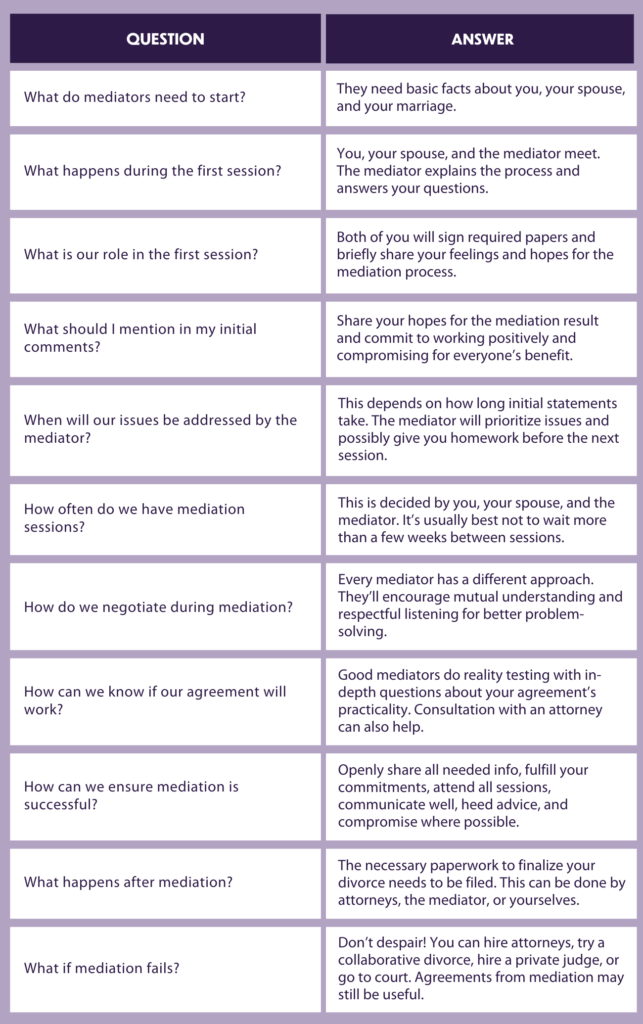Divorce is never easy, and it often carries hefty emotional and financial tolls. However, many couples find a less adversarial and more cost-effective alternative in divorce mediation. While the word “mediation” might initially evoke skepticism, the reality is that this process has a high rate of success. Even if you’re unsure about using it, understanding the ins and outs of mediation can make the divorce journey less intimidating.
Stepping Stones to Successful Divorce Mediation
Preparing for mediation involves a mix of practical and emotional steps. It’s important to take the time to prepare thoroughly to pave the way for a smoother, more successful process.
Step 1. Researching Mediation Options:
The first step in preparing for divorce mediation is researching the different types of mediation available to you. Some couples choose to use court mediators, while others prefer private mediators. Community mediators, lawyer-mediators, and therapist-mediators are also options. Conduct thorough research on the benefits and downsides of each type to determine which is the best fit for your situation.
Step 2. Deciding on a Mediator:
Once you’ve narrowed down your mediation options, you’ll need to choose a specific mediator. This decision should be based on several factors, including training, experience, approach, cost, and availability. Both you and your spouse should feel comfortable with the mediator you choose.
Step 3. Understanding Your Rights and Obligations:
Before attending your first mediation session, it’s important to understand your rights and obligations under the law. This knowledge can provide a framework for the discussions and help protect your interests. You might want to consult with an attorney to ensure you have a solid grasp of these matters.
Step 4. Organizing Financial Information:
As part of the divorce process, you’ll need to divide your assets and debts. To prepare for these discussions, gather and organize your financial information. This includes bank statements, tax returns, pay stubs, property deeds, mortgage statements, loan documents, retirement accounts, and any other relevant financial information. Make sure you understand the full extent of your financial situation, including the value of all assets and the amount of all debts.
Step 5. Prioritizing Your Goals:
Before mediation begins, spend some time thinking about what you hope to achieve in the divorce. What are your priorities and non-negotiables? What are you willing to compromise on? Having clear goals can help guide your decisions during mediation.
Step 6. Preparing Emotionally:
Divorce is often a highly emotional process. Emotional preparation is crucial for productive mediation sessions. Consider seeking support from a therapist, counselor, or divorce coach to help you manage your feelings and maintain a clear focus during mediation.
Step 7. Developing a Communication Strategy:
If communication has been a problem in your relationship, it may be beneficial to develop a communication strategy for the mediation process. This could involve setting ground rules for respectful conversation, practicing active listening, and finding ways to express your needs and concerns effectively.
Step 8. Consulting with an Attorney:
Even though you’re choosing mediation, it’s still a good idea to consult with an attorney. A consulting attorney can provide legal advice, review the terms of the agreement, and help ensure your rights are protected.
Step 9. Planning for the Future:
Finally, as you prepare for divorce mediation, start thinking about your post-divorce life. This includes considering how you’ll handle co-parenting (if applicable), budgeting for a single income, and planning for other major life changes.
Frequently Asked Questions About Divorce Mediation
Divorce mediation can seem like a complex and challenging process, but being informed can go a long way towards making it more manageable. Let’s dive into some of the most common questions you might encounter as you prepare for divorce mediation.

